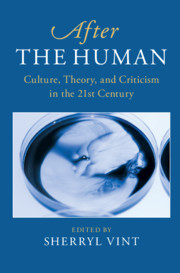Book contents
- After the Human
- After Series
- After the Human
- Copyright page
- Contents
- Contributors
- Acknowledgments
- Introduction
- Part I After Humanism
- Part II New Objects of Enquiry
- Part III Posthumanities
- Chapter 11 More-than-Human Biopolitics
- Chapter 12 New Materialisms
- Chapter 13 Speculative Realism
- Chapter 14 Race and the Limitations of “the Human”
- Chapter 15 Speculative Fiction
- Chapter 16 Aesthetic Manipulation of Life
- Collective Works Cited
- Index
Chapter 14 - Race and the Limitations of “the Human”
from Part III - Posthumanities
Published online by Cambridge University Press: 26 November 2020
- After the Human
- After Series
- After the Human
- Copyright page
- Contents
- Contributors
- Acknowledgments
- Introduction
- Part I After Humanism
- Part II New Objects of Enquiry
- Part III Posthumanities
- Chapter 11 More-than-Human Biopolitics
- Chapter 12 New Materialisms
- Chapter 13 Speculative Realism
- Chapter 14 Race and the Limitations of “the Human”
- Chapter 15 Speculative Fiction
- Chapter 16 Aesthetic Manipulation of Life
- Collective Works Cited
- Index
Summary
“Race and the Limitations of the Human” analyzes the racial dimensions of a process of humanization linked to imperial conquest. Rather than seeing in the violence committed against diverse peoples during the colonization of the Americas a force of dehumanization, this chapter reads this violence as part and parcel of the liberal western humanist order that continues to be experimentally and pedagogically worked out in colonial and nation-building projects. The chapter tracks this humanizing process through debates about Indigenous and Black humanity in conversation with critiques of posthumanist theory as an extension of the western enlightenment project. The question posed is whether—rather than understanding the “post-“ to refer to either an after to the humanizing project or a return to its initiatory moments as critical gesture—it might be better to view it as a suspension or refusal of the western colonial project and its racialized, humanized order.
- Type
- Chapter
- Information
- After the HumanCulture, Theory and Criticism in the 21st Century, pp. 206 - 219Publisher: Cambridge University PressPrint publication year: 2020
- 1
- Cited by

